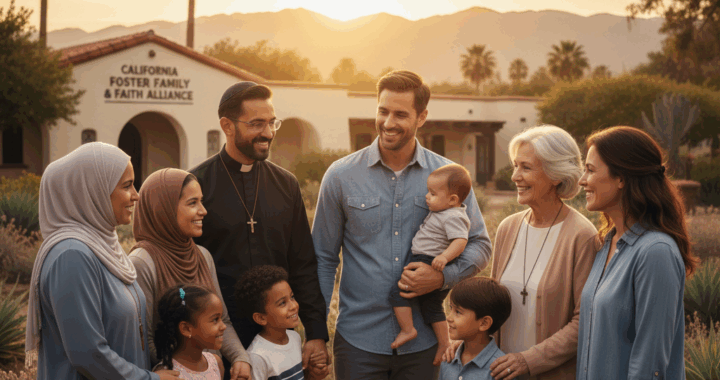California’s SB 407 and Foster Parenting: What Christian Families Need to Know (2025 Update)
California’s foster care system is changing—and faith-based families are feeling the impact. A 2023 law known as SB 407 tightened the state’s expectations for foster (or “resource”) families, requiring them to demonstrate the capacity, ability, and willingness to meet a child’s needs regardless of the child’s sexual orientation, gender identity, or gender expression. Supporters say this protects vulnerable youth; critics warn it sidelines many Christian families. Here’s what’s actually in play and what it means for families who want to serve.
A Pastoral Guide for Christian Families Navigating SB 407
It may feel like a collision course when Faith-Beliefs Meet Foster Care in California. As we walk this journey of faith and service together, I would like to offer encouragement and clarity to Christian families in California who are exploring foster care. If you feel called to open your home to children in need, the landscape is evolving—especially with the passage of Senate Bill 407 (SB 407). I hope to offer insight, compassion, and practical steps so you can proceed with confidence, integrity, and love.
Understanding What SB 407 Asks
SB 407 updates California’s foster-care licensing system, specifically the Resource Family Approval (RFA) process, by asking every approved family to show they can meet a child’s needs regardless of their sexual orientation, gender identity, or gender expression. The goal is to provide a safe home environment for all youth, including those whose identities or experiences may be unfamiliar to you. This is not simply legal jargon; it is a call to the heart: “Are we ready to love and support any vulnerable child placed in our care?” Free Download
Caring for Vulnerable Youth: A Faith-Based Lens
From a pastoral perspective, foster care reflects the heart of Christ: “I was a stranger and you welcomed me.” (Matthew 25:35). Yet, faith-based families rightly ask: What does it look like to welcome fully—without compromising gospel convictions?
-
Meeting a child where they are: Offering emotional safety and stability.
-
Engaging respectfully with their story: Being willing to listen, ask gentle questions, and grow when we don’t fully understand.
-
Holding to truth and love: Upholding your Christian convictions while committing to a child’s flourishing.
Why Critics Are Alarmed
A recent Revolver article contends the law and subsequent state guidance functionally exclude many Christian foster parents who cannot, in conscience, promise “affirmation.” It cites cases of renewal denials and warns that the standard is being enforced in a way that punishes traditional beliefs. Revolver News
Similar concerns have been raised by advocacy groups tracking implementation, which argue that the new standard can lead to denial or revocation if families refuse to agree to “affirm.” California Family Co
Points of Tension—and Where Grace Enters
The recent discourse suggests that some Christian families feel uneasy about RFA’s language around “affirmation” of gender identity. It may feel as though agreeing to everything automatically might conflict with deeply held beliefs. You’re not alone if you feel the tension between conviction and care.
Here’s what pastoral care suggests:
-
Clarity matters: define what “affirming” means for you—Is it validating identity, supporting the child’s wellbeing, or something more?
-
Honesty matters: when speaking with the licensing worker, state what you understand and believe. Uphold your faith-conviction gently but clearly.
-
Preparation matters: ask your agency about real-life scenarios. “If a youth in my home uses a pronoun I’m unsure about, how will the agency support me?”
-
Community matters: you may be entering new emotional territory. Seek a support group (faith-based or secular) of foster parents who can help you navigate the emotional ups and downs.
Renewals & Practical Steps for Your Family
Because SB 407 covers both new approvals and renewals, it’s wise to walk this journey proactively:
-
Reflect together: How will our family respond when a youth in our home faces questions about identity?
-
Consult with your licensing representative: Learn about your county’s approach to RFA under SB 407. Get clarity about training, expectations, and renewal criteria.
-
Write it down: Document your family’s approach to welcoming children—including how you handle sensitive topics. This can help keep your renewal visits grounded.
-
Stay informed: RFA procedures in 2025 are being updated through state “All County Letters.” Ask your county how they’re implementing SB 407 now.
-
Pray and lean on community: Foster parenting is emotionally rich—and taxing. Your spiritual life, church family, and peer support all matter.
A Word of Comfort
The change before you may feel heavy, but it’s part of a bigger story. As a therapist and a believer, I see this not simply as “law vs. faith,” but as a tension where grace can transform every young person’s life—and yours, too. Your willingness to open your home and heart reflects a deeper movement of the Kingdom, where children heal, families thrive, and God’s love is lived out.
If you feel called to foster care, or are already on the path, you’re not alone. Whether you navigate paperwork with the county, wrestle with emotional questions, or wrestle with your conscience, there’s hope, support, and a purpose greater than any single form.
Sources
-
Revolver coverage of the issue and its criticism of SB 407’s impact on Christian foster families (Oct. 30, 2025). Revolver News
-
Bill text/analyses confirming the requirements of SB 407 and the RFA standards. LegiScan+1
-
California Department of Social Services “All County Letters” page (showing 2025 updates, including RFA implementation guidance). California Department of Social Services
-
Advocacy perspective summarizing reported denials under SB 407. California Family Council


